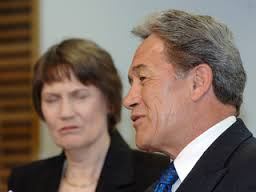
The National Party is clearly and evidently falling out of favour with the New Zealand electorate. An opinion poll publicised last night showed that the Labour Party now has more public support than National, for the first time since John Key became Prime Minister in 2008. The various coalition possibilities after September 23 are numerous, but this essay argues that a Canterbury Government would be the best for New Zealand.
This means Canterbury as in red and black, not the province. In other words, a coalition of Labour and New Zealand First would be the most likely to improve the standard of living of New Zealanders.
We can’t take it for granted that Labour will win just yet, but the signs are ominous for Bill English. Usually the incumbent Prime Minister dominates the Preferred Prime Minister poll against all comers. This has been the case ever since Jim Bolger was in charge. However, Jacinda Ardern is now ahead of English in the latest poll, despite being in opposition.
Moreover, the Labour Party has leaped almost 20% in the polls since Ardern became leader. This is partly because the electorate did not think highly of the stuffy Andrew Little, but mostly because of the growing perception that the National Party has completely lost control of immigration, of housing and of mental healthcare. The long-term effects of slashing funding to rape crisis centres and suicide hotlines for the sake of tax cuts are now starting to be felt, and the feeling is bitter.
The heartfelt desire in many quarters is for a Watermelon Government after the 23rd, namely Labour in coalition with the Greens. Indeed, this seemed like the most likely outcome for a long time – the Greens were, until recently, polling at close to 15%, and that meant that Labour only had to get up to 32-33% for the two parties to rule without any outside help.
Unfortunately for Meteria Turei and her Greens, the chaos of recent weeks has eaten away at that support. The party effectively committed seppuku in the wake of Turei’s confession about cheating WINZ and the electorate no longer seems to consider them to be a competent and reliable party.
This is where a Canterbury Government could be the most effective. The black of New Zealand First could help moderate the excesses of the reds in Labour, and prevent the lunatics in the Greens from having any excess influence.
Perhaps the most dangerous, if not outright suicidal, of the Greens’ policies relates to their desire to raise the “refugee” quota to several thousand. Letting in hordes of fighting age men who are possessed by criminal religious attitudes has been a catastrophe for Europe, yet the Greens, mad with ideology, would happily make the same error here.
As we have seen in Europe, the problem with letting in even a thousand “refugees” is that they soon become eligible to bring their families here, and then those family members become eligible to bring other family members here, and eventually the floodgates cannot be closed.
Peters and New Zealand First would provide a much-needed nationalist bulwark to this fashionable Marxist insanity. Peters is not afraid to have crowds of hysterical teenagers and twentysomethings shrieking “Racist!” at him – he’s endured much worse in his time in politics.
If he does become the kingmaker after the 23rd, he is therefore in a good position to reject the demands of the Greens to throw open the borders. This will make it possible for the Sixth Labour Government to focus on the issues that matter to all Kiwis, in particular housing, wages, mental health and drug law reform.
Considering that Peters has already shown himself entirely capable of working successfully with a younger, intellectual, female Prime Minister, as he did with Helen Clark between 2005 and 2008, there is good reason to think that a Canterbury Government is the best option for maintaining and raising the Kiwi standard of living for the next electoral cycle.
